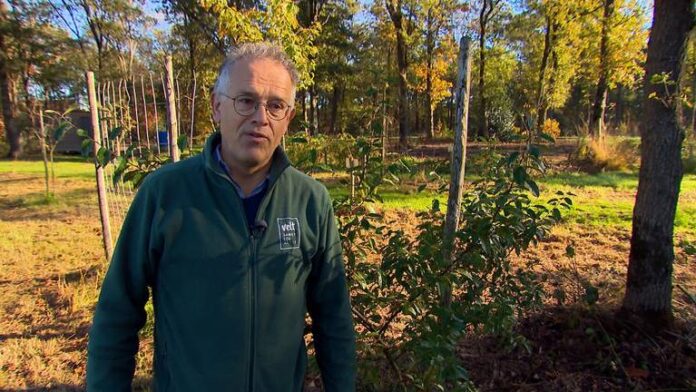“This is a hazel for hazelnuts. This cutting should grow into a fig tree. You can pick raspberries here next year and delicious berries grow further down.” John Vermeer gives an enthusiastic tour in a forest garden in the Oirschot Municipality. He is there with thirty students who have all taken an agriforestry course at the Brabantse Milieu Federatie (Brabant Environmental Federation).
Forest gardens are advancing in Noord-Brabant. The province now has two hundred and fifty hectares of these nutrient-rich green places, making it the leader in the Netherlands. Course participants can learn on site: which trees and shrubs reinforce each other and can stand well together. Where do the soil, insects and birds benefit and how should it all be cared for.
“It’s a hugely hopeful concept,” says food forest guru Vermeer. “Some people have a patch of land that they convert into a forest garden for fun. Others do it professionally, but then you need several hectares. Often, a forest garden is part of an existing farm, like in Oirschot. There, the Schepens family’s dairy farm has been converted into a recreational farm with forest garden. In three tiny houses, visitors can enjoy the tranquillity of the forest garden. They can also walk through it to collect their own granola.
Conversion
Farmer’s son Stan Schepens didn’t see any point in taking over the dairy farm. Now that it is a new farm with a forest garden, he has changed his mind. “I couldn’t have imagined this ten years ago,” he says.
Stan takes the trainees on a tour in his forest garden. Edy is one of the trainees. He would love to continue in this direction, but unfortunately does not yet have a piece of land to make a start. Trainee Nel does have an acre of ground around her house. She is determined to turn it into a forest garden. Jessica is already involved in a food forest in Dongen “We have to deal with nature and food in a different way and therefore also with humans. It’s about time,” she says.
The course participants are already almost as enthusiastic as course leader John Vermeer. He has been promoting the concept for seven years now. “It will not be the only food production, but one of the new possibilities”, he says.
Patience is a virtue. Once a forest is planted, it takes about five years before you can literally reap the benefits. But after that, according to Vermeer, you can enjoy it for centuries. “And not only people can get food there. A quarter of the food goes to birds, insects and other animals. I hope we can save the world bit by bit with initiatives like this.”
Source: Omroep Brabant
Translator: Martijn











